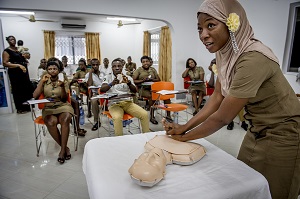Human Capacity Development
Sustained improvement of reproductive, maternal, newborn and child health (RMNCH) outcomes cannot be achieved without investing in human capacity development. High-impact interventions can only be sustained at scale if health workers are supported and strengthened to deliver these interventions. MCSP aimed to ensure that our country programs implemented the most efficient and effective mechanisms to promote human capacity development.
Human capacity development teaches someone to do something or to do it better. MCSP defined our work in human capacity development as the processes used to develop individual and team abilities to set goals, and to strengthen and maintain the competencies required for individual and team roles in the health system.
USAID’s Vision for Health Systems Strengthening prioritizes human resources for health and transformative models for education and maintenance of skills for the delivery of essential services. With those priorities in mind, MCSP applied evidence-based approaches to human capacity development and sought to transform traditional approaches that have not had the desired outcomes.
MCSP prioritized four primary approaches to human capacity development:
- Pre-service education: Curriculum of studies that prepares health personnel for entry into the health profession. For MCSP’s approach to pre-service education, click here.
- In-service training: Structured and formal training approach for health care workers and managers (after completion of pre-service education) to reinforce existing competencies or to develop new ones. For MCSP’s approach to in-service training, click here.
- Mentoring: Process through which an empathetic person proficient in a specific content area (mentor) teaches and coaches an individual or group of individuals (mentees) in that area. For MCSP’s implementation principles and guidance on mentoring for human capacity development, click here.
- Supportive supervision: Process of helping staff to improve their own work performance continuously; carried out in a respectful and non-authoritarian way, using supervisory visits as an opportunity to improve knowledge and skills of health staff, often with the aid of formal checklists or assessment forms.
Across MCSP country programs, integrated human capacity development strategies addressed the continuum from competency development to competency maintenance. Design and implementation of education, training, mentoring and supervision varied based on the country context for health workers and managers.
Key priorities included:
- Service delivery and clinical competencies (both at the community and facility levels)
- Quality Improvement competencies
- Management competencies
To learn more about MCSP’s approach to Human Capacity Development, click here.

